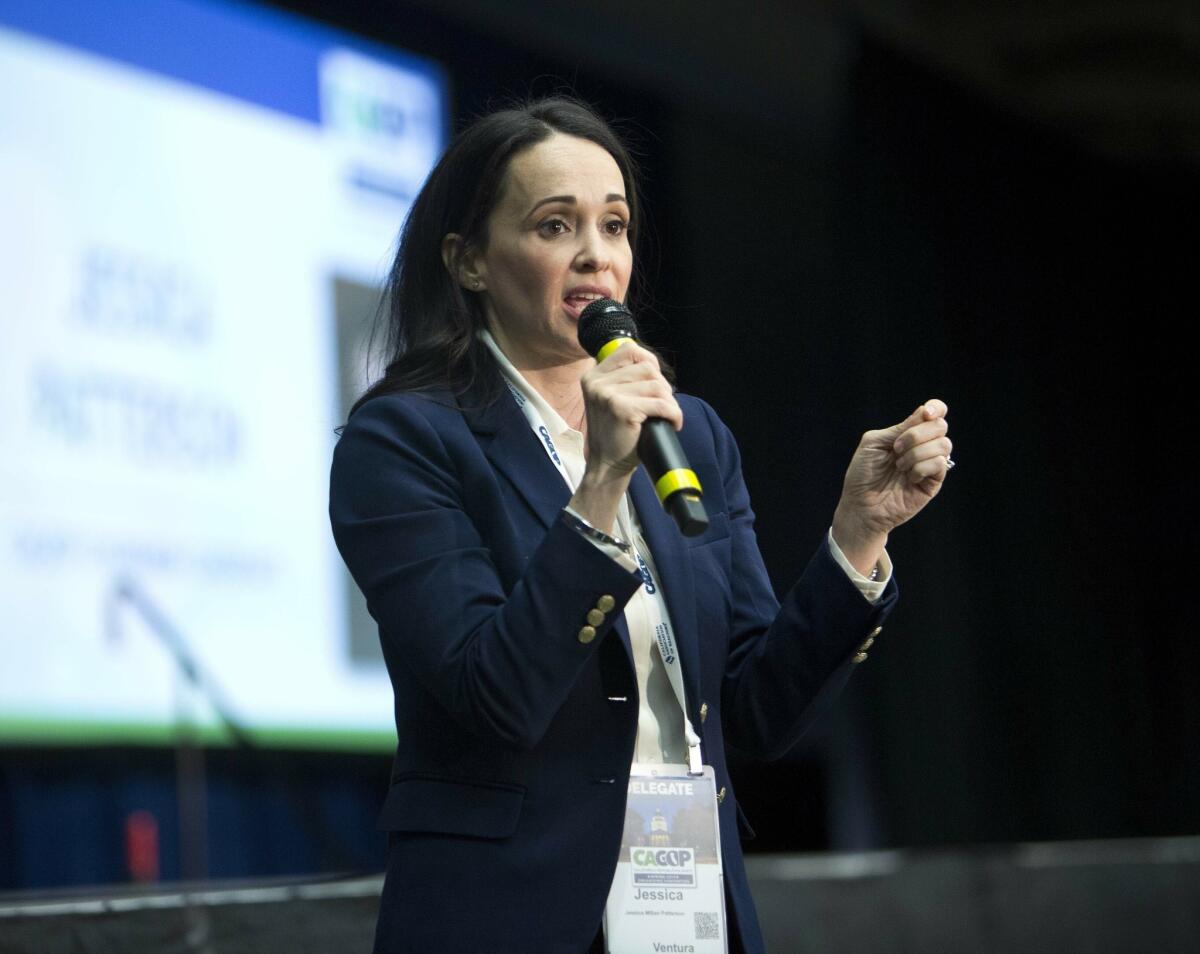The leader of California’s Republican Party has a strategy for success: Never mention Trump

- Share via
SACRAMENTO — If the leader of the California Republican Party had her way, GOP candidates in this state would never mention President Trump’s name.
Not that Jessica Millan Patterson is trashing Trump — it’s hard to imagine a state Republican leader badmouthing a GOP president — but she devours the polls like every political pro. And polls consistently show that throughout most of California, Trump’s name is dirt.
The latest poll by the nonpartisan Public Policy Institute of California found that among likely voters, 94% of Democrats and 57% of independents disapprove of Trump’s job performance. It was approved by 84% of Republicans, but they’ve become increasingly scarce in California.
So for any Republican candidate running in a competitive district against a Democrat, warmly embracing the unpopular president would be a vote-killer.
Patterson, chairwoman of the California Republican Party, says legislative candidates should campaign only on state and local issues and avoid all subjects presidential.
Congressional candidates might assail Vermont Sen. Bernie Sanders’ call for single-payer, government-only health insurance — tying it to all Democrats — but they should similarly focus on the everyday problems of California voters, she says.
“Our focus in California is on keeping it local,” Patterson told me when asked how Republican candidates should handle Trump. “We’re going to be talking about things happening here and affecting voters’ lives — focused on what’s happening in Sacramento. Democrats have given us a lot to work with.”
She’d also change the vocabulary of state politicians. They’d discard Sacramento-speak and talk to voters in plain words about their daily problems and concerns.
“Everyone in Sacramento talks in a different language,” she complains.
Such as? “’Bill numbers,’ ‘authors’ and ‘coauthors,’ ‘hearings,’ ‘amendments.’”
Well, yeah, it’s the basic language of governing, presumably taught in high school civics classes. But it does prompt eye glazing and drowsiness.
“They should talk to voters about how much more some [Democratic proposal] is going to cost them as taxpayers,” Patterson says. “Talk about issues that are important to people.”
One more thing, she says: Republican politicians should show up more.
“Democrats show up,” Patterson says. “Many voters don’t think Republicans care about their problems.”
She doesn’t mean merely showing up at campaign fundraisers. She’s talking about showing up at meetings in lodge halls and local hangouts to listen to voters’ problems and discuss solutions — “engaging every single community” and gaining trust.
Patterson showed up at my office the other day to talk about how she’s trying to rebuild the crumbled California Republican Party one year after being elected its chairwoman at a state convention. She’s articulate, energetic and savvy. Delegates chose her over a firebrand conservative. Patterson ran as a pragmatist.
Sacramento consultant and former advisor to Gov. Arnold Schwarzenegger Cassandra Pye, who is black, told The Times at the convention:
“We’ve been a party that’s essentially got a face that is primarily white and male and old. It’s time we turn the party over to another generation and to some folks that look more like the rest of California.”
Patterson’s election was a significant step in that direction. She is the first Latino and first woman to be elected head of the California Republican Party.
Moreover, the two Republican leaders of the Legislature are women: Sen. Shannon Grove of Bakersfield and Assemblywoman Marie Waldron of Escondido.
A lifelong political junkie, Patterson, 39, grew up in Montebello and went to Cal State Northridge, majoring in political science. After college, she immediately began working in politics. She lives in Simi Valley with her two young daughters and husband, an assistant dean at the USC Viterbi School of Engineering.
As the full-time CRP chairwoman, Patterson is paid $250,000 annually — almost twice the $127,500 salary California Democrats pay their state chairman, Rusty Hicks.
Patterson’s parents were both Democrats — her dad a Teamsters union shop steward and her mom a “Reagan Democrat.” Her father was of Mexican descent. Her mother was Irish and Ukrainian, a strong Catholic drawn toward the GOP by its opposition to abortion. Patterson also is anti-abortion, but says she has never been a “pro-life” activist.
In California, where voters strongly support abortion rights, Republican candidates wisely stopped focusing on the issue several years ago. The last two Republican governors — Schwarzenegger and Pete Wilson — were both “pro-choice” abortion rights advocates.
But Californians haven’t elected a Republican to statewide office since 2006. It’s strictly one-party rule in Sacramento. Democrats hold supermajorities in both legislative houses.
And Democrats dominate the California delegation to the U.S. House by 46 to 7. Republicans lost half their seats in 2018 when Democrats tagged GOP incumbents as Trump toadies.
“Coming out of November 2018, we were in incredibly dark times,” Patterson says. “But that darkness has been filled with some hope, some excitement and just the right amount of people being pissed off — about everything from homelessness to just being able to afford staying in California any longer …
“We see that in candidate recruitment, volunteer recruitment and online contributions.”
Patterson says the party raised $1 million online last year, a 1,000% increase. There has been a 33% increase in major donors.
But Republican voter registration has fallen in recent decades to 23.7% of the electorate, far behind Democrats, who are at 44.6%. The GOP even trails “no party preference” independents, 25.9%.
Democrats could be a huge help to California Republicans by dumping Trump in November.
More to Read
Sign up for Essential California
The most important California stories and recommendations in your inbox every morning.
You may occasionally receive promotional content from the Los Angeles Times.














